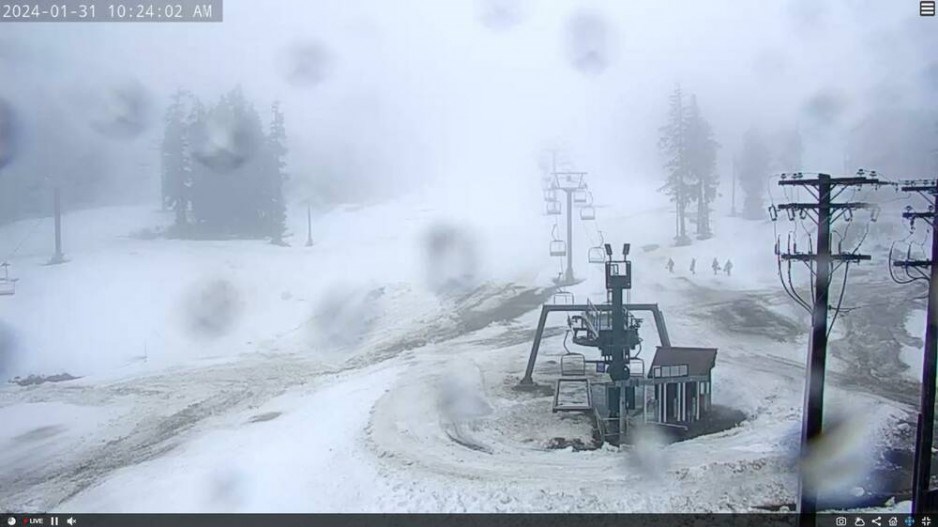Mount Washington Alpine Resort closed its chairlifts and cross-country trails Wednesday and today, citing warm weather and heavy rain.
Rain fell throughout the day Wednesday, but was expected to clear in the evening, the resort said. Crews are expected to be out today repairing terrain, with the tentative goal of reopening Friday.
“We hope to hunker down during this downpour to maintain what we can of the slope conditions for when colder temperatures arrive,” the resort said Wednesday.
Mount Washington was reporting moderate rain and a temperature of 4 C at 4:30 p.m. Wednesday. Its snowbase had dropped to 44 centimetres from 56 cm on Monday.
The resort is expecting colder weather later in the week, with below-freezing temperatures forecast for Friday and Saturday.
All three mountains on Vancouver’s North Shore also closed Wednesday in a season that has challenged ski resorts across the province with warm temperatures and little snowfall.
B.C. is experiencing severe El Niño conditions, which bring warmer-than-average temperatures and less precipitation. The provincial snowpack was just 56 per cent of normal at the start of the year, according to the province’s Snow Survey and Water Supply Bulletin.
Armel Castellan, a volunteer youth coach with the Strathcona Nordic Ski Club based at Mount Washington, said the club has cancelled weekend programming or shifted to dry-land training as a result of the lack of snow.
The club cancelled races this weekend that draw people from across the province and provide an opportunity for children to race in an inclusive environment.
“It just doesn’t look promising for the better part of a week or so,” said Castellan, who is also a warning preparedness meteorologist for Environment Canada.
From next Tuesday onward, the forecast is too unpredictable to say whether snow is coming to the mountain, he said.
Early next week is looking dry, but snow-making could be possible, he said.
“We’re all very hopeful that we can salvage a season here, but I think the alternative is that things stay warm and we do not see any more skiing this year. And I guess that’s also a real possibility,” Castellan said.
After a brief cold snap in mid-January, the coast has hit record-high temperatures, with Victoria seeing its warmest Jan. 29 on record at 15.3 C.
Campbell River broke a 61-year record the same day, setting a new highest minimum temperature for any day in December, January or February at 9.5 C, Castellan said.
“It’s nice to wear a T-shirt in the middle of winter but it’s wrong on all the other levels,” he said.
The warm weather is also increasing flood risk, and people should be aware of road conditions and river levels, Castellan said.
Drivers should be cautious around fast-moving water, which can flip vehicles, he said, noting that’s what happened four years ago on Jan. 31, 2020, when three Sooke men believed to be driving near the lower parking lot of Sooke Potholes Regional Park were swept into the Sooke River and drowned.
The Ministry of Emergency Management and Climate Readiness has said just six inches of fast-moving water can knock over an adult and two feet is enough to carry away most vehicles.
B.C. Hydro spokesman Stephen Watson said the electricity provider had issued a public safety advisory for the Puntledge and Campbell rivers, as well as Elk Falls Canyon on Vancouver Island, warning of high flows of water discharged from dams.
Watson posted videos to social media showing both river systems as raging torrents.
He said peak inflow of water into the Campbell River on Monday reached 1,310 cubic metres per second, enough to fill an Olympic pool in less than two seconds.
“The volume of water that’s coming in is quite massive,” Watson said Wednesday. “Even as a daily average, yesterday we were getting an Olympic-size swimming pool about every 2.5 seconds, 24-seven.”
He added that the Elsie Lake reservoir in central Vancouver Island was at levels not seen in a decade, and dam discharges were necessary to make sure there was capacity for more rain in the forecast.
— With files from The Canadian Press
>>> To comment on this article, write a letter to the editor: [email protected]




